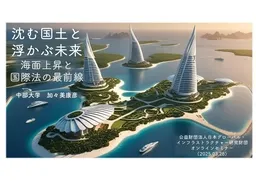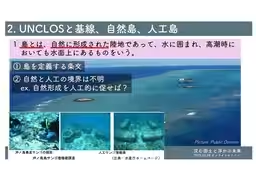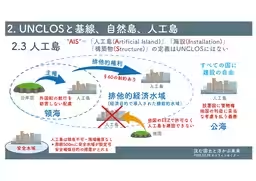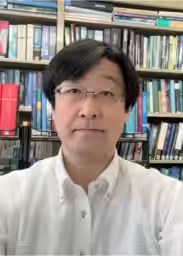

The Future of Adaptation: Rising Sea Levels and International Law Challenges
Seminar on Rising Sea Levels and International Law
On March 28, 2025, the Japan Global Infrastructure Research Foundation (Japan GIF) hosted an online seminar titled "Sinking Land and Rising Future—The Frontlines of Sea Level Rise and International Law." The lecture, conducted via Zoom, featured Professor Yasuhiko Kagami from Chubu University, an expert in international law with a focus on maritime issues.
Purpose of the Seminar
As climate change progresses, many countries face severe threats of land loss due to rising sea levels. A critical question emerges: If a country’s territory were submerged, what would happen to its identity as a nation in international law? There is ongoing debate regarding the preservation of Exclusive Economic Zones (EEZ) and whether nations can claim their territories if their lands are lost.
Artificial islands have been proposed as a potential adaptation measure to rising sea levels. However, these structures are not currently recognized as territorial entities in international law, leaving their rights and statuses unclear. The seminar aimed to delve into these pressing issues, analyzing the intersection of international law, particularly maritime law, and the challenges posed by climate change.
Key Discussion Points
1. Introduction to Key Concepts: The seminar began with foundational terms and the significance of the 1982 United Nations Convention on the Law of the Sea (UNCLOS), often referred to as the constitution of the seas. It outlines jurisdictions such as territorial seas and EEZs while delineating the sovereign rights of coastal states. The importance of "base points" for establishing this jurisdiction was also underscored.
2. Natural vs. Artificial Islands: The distinction between natural islands and artificial structures was critically analyzed. UNCLOS defines natural islands in Article 121 as naturally formed land, surrounded by water and above water at high tide. However, there's ambiguity regarding the boundary between natural and artificial formations. A notable case from the 2016 South China Sea arbitration, which debated whether features were islands or rocks, illustrated the complexities involved in defining these entities under international law.
Additionally, UNCLOS does not provide a legal definition for artificial islands, meaning they lack territorial rights and resource claims. The seminar elaborated on the regulatory framework surrounding the construction of artificial islands within EEZs and territorial seas, highlighting significant cases wherein countries built islands without permission, sparking legal disputes.
3. Adaptation Strategies for Sea Level Rise: Participants engaged in discussions about strategies for adapting to rising seas, including the potential to fix baselines for territorial seas. Current international considerations include whether baseline adjustment should be invoked in reaction to climate-induced changes. There is significant debate around whether entirely submerged territory would result in a state ceasing to exist altogether.
At the same time, projects such as the Maldives and the UAE's artificial islands indicate a growing interest in constructing landforms designed for habitation in response to climate self-defense strategies, emphasizing the necessity of international agreements to establish legal frameworks around these constructs to safeguard global resources.
Post-Seminar Insights: After the presentation, a dynamic Q&A session revolved around the implications of transforming low-tide elevations into artificial islands, the administrative burdens tied to floating cities, and whether customary law or specific regulations should guide adaptation to rising sea levels. Participants showed heightened interest in the issues surrounding artificial islands and the fixing of baselines, reflecting a collective awareness of the pressing nature of climate change and its legal ramifications.
Seminar Overview
- - Organizer: Japan Global Infrastructure Research Foundation (Japan GIF)
- - Date: March 28, 2025, 14:00 to 15:30 JST.
- - Format: Online webinar via Zoom.
- - Speaker: Professor Yasuhiko Kagami, Chubu University.
- - Chair: Akiko Sakamoto, Japan GIF Secretary-General.
- - Participation Fee: Free of charge.
- - Video link: YouTube Seminar
Speaker Profile
Yasuhiko Kagami is a professor at Chubu University specializing in international relations and law, with notable contributions to maritime policy. His extensive career includes roles in various government and academic committees, focusing on the implications of international maritime laws, including current research on the legal status of islands and the impact of climate change on territorial integrity. His recent publications detail the developments in international case law concerning marine territory and state rights, emphasizing an urgent call for coherent policy frameworks to combat climate-related challenges.
This seminar highlighted the increasing pertinence of reexamining how international law can adapt to unprecedented climate changes, particularly as we venture into an uncertain future marked by rising sea levels and the quest for sustainable solutions.




Topics Policy & Public Interest)










【About Using Articles】
You can freely use the title and article content by linking to the page where the article is posted.
※ Images cannot be used.
【About Links】
Links are free to use.